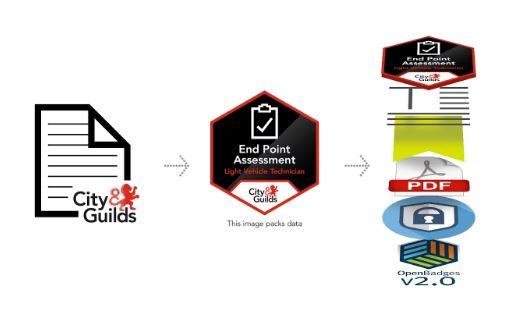For the first time, an internationally recognised City & Guilds Certificate in 18th Edition Wiring Regulations is accompanied by a verifiable Digital Credential.
Ask any practising electrician, surveyor or consultant working in trades with an understanding of electrical wiring and they are likely to mention the IET 18th Edition Wiring Regulations (BS 7671).
Since the launch of an update to the standard and the accompanying City & Guilds 2382-18 – 18th Edition Course in July 2018, City & Guilds has worked with 250 centres nationwide to ensure over 17,000 individuals not only have the relevant knowledge and skills in order to comply with new standard, but can also share their compliance with customers in a way that is secure and verifiable using a Digital Credential that is issued alongside the City & Guilds certificate.
What is a Digital Credential?
Traditionally, credentials are represented by a certificate as an objective statement of achievement or status issued to an individual by a trusted third party. When reviewed this helps the viewer to make more confident decisions around connecting the right individual with future opportunities, jobs projects.
A digital credential is a simply the online representation of a credential. They are a visual, data-rich and secure format that communicates and verifies the objective statement of knowledge and skills attained with the click of a button.
With Digital Credentials, individuals are able to collect and showcase all their achievements together and share them out to wider networks online to be seen, understood and discovered by those who need their expertise.
According to City & Guilds, when individuals have portable, verified evidence in a format suitable for the online world detailing what they know and of what they can do and what they’ve done, they are better able to connect to new opportunities as they advance through their lives, and one way that happens at scale is when individuals can tell the full story of what it is they know and what they can do in a trusted way.
The Digital Credential, when shared and clicked by others in the learners network, links directly back to information about the course – resulting in a more discoverable offer for training providers.
Chris Kirk, Managing Director of Digitalme (a City & Guilds Group Business), said: “What’s great about the 18th Edition being Digitally Credentialed is that it’s a true license to practice qualification – it’s something that every electrical installer need to have and need to prove.
“That’s really where digital credentials come into their own, because they can be shared on social media, on a website, and within a client email – to prove those who have qualified have met the standard.
“What we’re excited about is that this is our first City & Guilds use of the Credly Acclaim Platform which is an upgrade on our previous Credly Technology and in total more than 40,000 people are able to receive this digital credential, and what the Credly Acclaim platform will allow them to do is not only create a profile and share their credential but also to connect to the labour market information and the jobs boards related to that qualification as well, so it becomes a tool they can use to gain employment – it’s an exciting time to kick off our new adventure.”
The Electrotechnical Certification Scheme (ESC) administered in England, Wales and Northern Ireland by the Joint Industry Board (JIB) has been responding to the industry’s appetite for digital applications with the recent introduction of systems including virtual ECS cards, online card checking and mobile apps with 98% of their card holders now applying for and renewing cards online.
JIB Chief Executive Steve Brawley, said: “We support the development of Digital Credentials by City & Guilds and we look forward to working with the City & Guilds team to explore the potential benefits they offer to our Scheme.”



